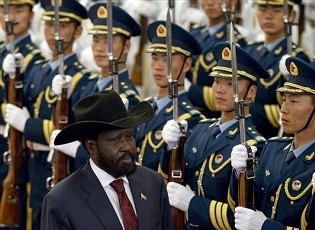China non-committal on financing South Sudan pipeline as Kiir cuts short his visit
April 25, 2012 (KHARTOUM) – The South Sudanese president Salva Kiir unexpectedly cut short his five-day visit to China as the latter showed reluctance to give green light for Juba’s request that Beijing finance an alternative oil pipeline.

A row erupted between Khartoum and Juba as negotiations on oil transportation fees failed to result in a breakthrough. Late last year, Sudan started to seize part of the south’s oil as payment in kind causing Juba to retaliate and stop its oil production altogether.
China, which has multi-billion dollar investments in the two Sudans, found itself forced to tread carefully so as not to alienate either side.
The dispute between north and South Sudan escalated into a military conflict particularly following Juba’s takeover of the oil-rich town of Heglig in South Kordofan two weeks ago. Sudan’s army managed to recapture the area last Friday but amid reports of severe damage to oil facilities there which a parliamentary official in Khartoum estimated to cost $3 billion.
On Monday China urged Sudan and South Sudan to protect the rights and interests of Chinese oil companies that have established projects in the two countries.
“Chinese oil companies and their partners have major projects in both Sudan and South Sudan. Their legitimate rights and interests deserve substantial protection,” Foreign Ministry spokesman Liu Weimin said.
The remarks were the clearest sign of Beijing worries over the impact the dispute could have on its investments in Sudan and South Sudan.
South Sudan’s presidential visit to Beijing started on Tuesday aiming to get Chinese diplomatic and economic backing in its conflict with Khartoum particularly in constructing a new pipeline that could allow it to export its oil through Kenya instead of Sudan.
Kiir told his Chinese counterpart Hu Jintao that Sudan has declared war on his country and hailed the Asian power as “economic and strategic partners”.
The two countries signed a number of agreements related to loans from China’s Export-Import Bank, assistance for anti-malaria drugs, solar energy projects and humanitarian aid but there was no word on financing the pipeline.
Today it was announced that Kiir would cancel his stop at Shanghai and cut his visit short.
“It is unfortunate that you have to shorten your stay in China due to domestic issues and are not going to Shanghai,” China’s parliamentary chief Wu Bangguo told Kiir as the two men began talks in the presence of journalists.
There was no indication when Kiir would leave the country.
A government official in Juba and the Chinese foreign ministry gave no reason to Reuters on why the Shanghai leg of Kiir’s visit had been cancelled.
China would be a logical financier for such a pipeline, Li Xinfeng, a researcher at the Institute of West Asian and African Studies at the Chinese Academy of Social Sciences told the New York Times (NYT). But any decision by China would be made on a commercial, not political, basis, he said.
“Beijing wants to improve its relations with the south because the oil is there,” Claire Wong, an analyst with PFC Energy in Singapore told NYT.
But for China to finance a pipeline that provided an alternative route for to carrying South Sudan’s oil north through Sudan would antagonise the Sudanese government and further inflame an already incendiary situation, Ms. Wong said.
“If the south went too far with a pipeline it would incite the north to stronger action against the south,” she said.
Wu told Kiir during the meeting that Beijing supported South Sudan’s efforts to develop its economy and pledged cooperation, Chinese state television reported.
Beijing nonetheless announced that it will dispatch its new envoy to Africa Zhong Jianhua to Khartoum and Juba in a new mediation effort.
“This is the second time he will go to Sudan and South Sudan to promote talks,” Foreign Ministry spokesman Liu Weimin said.
An attempt to mediate on the oil dispute by China’s previous envoy last December failed.
(ST)

